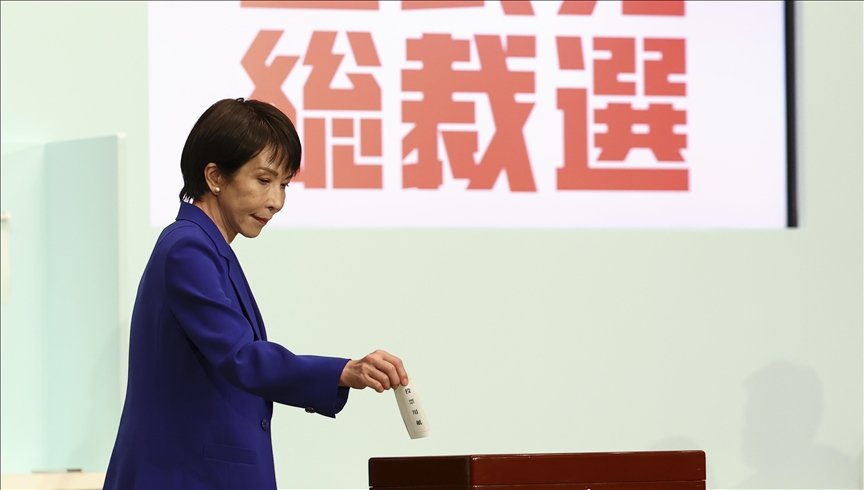PROFILE - Who is Sanae Takaichi: Japan’s incoming 1st female prime minister
9 times lawmaker with hardline conservative views, Takaichi takes a hawkish stance in diplomacy, particularly towards China, and trade issues

- Immediate challenges to Takaichi, 64, include Trump administration, ties with China, South Korea, as well as domestic economic issues and political polarization
- Taikachi would likely be 104th prime minister of Japan
ISTANBUL
Japan is set to welcome the nation's first female prime minister after the ruling Liberal Democratic Party (LDP) elected hardline conservative Sanae Takaichi as its next leader on Saturday.
The 64-year-old politician was born on March 7, 1961, in Yamatokoriyama City, Nara Prefecture, located in the western part of Honshu, Japan’s main island.
Takaichi studied at Kobe University in Japan. After graduation, she worked as an author, legislative aide, and broadcaster before entering politics. She was first elected to the House of Representatives in the 1993 general election as an independent, later joining the LDP. Since then, she has been re-elected to the House nine times.
Takaichi won the runoff with 185 votes, defeating Farm Minister Shinjiro Koizumi, who was widely expected to win, with 156 votes.
The LDP leadership vote, originally scheduled for 2027, was moved forward after Prime Minister Shigeru Ishiba announced his resignation on Sept. 7, following the coalition’s defeat in July’s Upper House elections.
Takaichi also ran in the 2021 LDP leadership election but finished third in the first round, which disqualified her from the runoff. She again sought the party’s top position in 2024 but narrowly lost to Ishiba in the second round.
Takaichi’s term will now cover the remaining two years of Ishiba’s original three-year tenure, until September 2027.
The new party president is widely expected to become Japan’s 104th prime minister, although the LDP-led coalition no longer holds a majority in parliament due to a rift in opposition parties that remain divided.
If Takaichi becomes Japan’s next prime minister, she will be the first woman to hold the office.
In Japan, a new ruling party leader is subsequently elected as prime minister.
The date for new prime ministerial elections has not yet been decided.
A potential challenge for the LDP is that its coalition partner, Komeito, has previously expressed a preference for a moderate prime minister, something Takaichi does not represent.
Since former Premier Shinzo Abe’s assassination in 2022 in Takaichi’s hometown of Nara, the LDP leadership has faced numerous challenges, including scandals such as a slush fund case involving the alleged misuse of campaign funds by the Abe and Shisuikai factions.
She would be the fourth prime minister since Abe’s assassination, who was succeeded by Yoshihide Suga, Fumio Kishida and Shigeru Ishiba.
She is a former protege of Abe, and was the internal affairs and communications minister under his premiership from 2019 to 2020.
Takaichi's hawkish, conservative views
Her new position as the LDP chief has brought her hardline conservative views into focus, raising questions about what her leadership might mean for Japan, as she is widely expected to become the country’s next prime minister.
Takaichi aligns herself with Shinzo Abe’s conservative views, takes a hawkish stance on diplomacy, particularly toward China, and considers herself his political successor.
“On the whole, she wants to go even further than Abe in building out a security establishment that will defend the Japanese people from a broader range of threats, including not only military threats, but economic security, food security, and, as she emphasized during the campaign, the threats posed by Japan's growing foreign population and over-tourism,” said Japanese expert Tobias Harris, as cited by the Nikkei Asia.
Some of Takaichi’s views on World War II include criticizing textbooks that omit “the great achievements of our predecessors” and referring to Japan's “overseas advances” as “aggression,” among other points, according to a 2004 column on her website.
Takaichi herself also said in her victory speech that “there are numerous policies, many of which must be implemented swiftly.”
“Everyone (LDP lawmakers) will be required to work - work like a horse. I will abandon the notion of work-life balance. Work, work, work, work, work - that is what I will do. I sincerely ask each and every one of you to work tirelessly in your respective fields for the sake of Japan and to rebuild the LDP,” she added.
Earlier this week, Takaichi called Taiwan “an extremely important partner and a valued friend for Japan.”
Takaichi’s election also raises questions for the trade deal Japan made with the US.
She had earlier stated that Tokyo “must stand” its ground if anything “unfair that is not in Japan’s interests comes to light in the process of implementing the deal” regarding the $550 billion Japanese investment fund that the East Asian nation pledged to Washington as part of the lowered tariff deal, according to Bloomberg. Takaichi had not ruled out a potential renegotiation of the deal.
Takaichi is also a member of the Nippon Kaigi, Japan’s largest ultranationalist and conservative group. The organization aims to “change the postwar national consciousness based on the Tokyo Tribunal's view of history as a fundamental problem" and to revise Japan's current pacifist Constitution.
Controversial Yasukuni Shrine visits
Takaichi has openly visited the controversial war-linked Yasukuni Shrine several times.
The Yasukuni Shrine was built in 1869 by Emperor Meiji and was dedicated to the Japanese soldiers who died in the wars since the Meiji Restoration. It now honors 2.5 million war dead, including 14 convicted war criminals from World War II.
The shrine has long been a source of diplomatic tension between Japan and its neighbors, particularly South Korea and China, which view visits as a sign of Japan’s failure to fully acknowledge its wartime past.
Anadolu Agency website contains only a portion of the news stories offered to subscribers in the AA News Broadcasting System (HAS), and in summarized form. Please contact us for subscription options.







